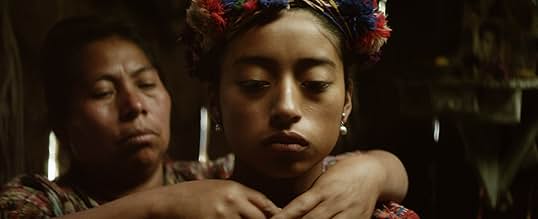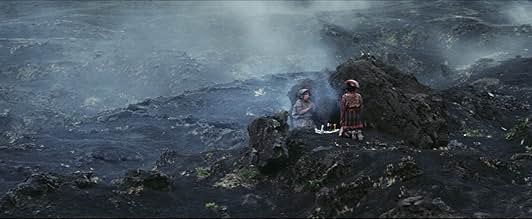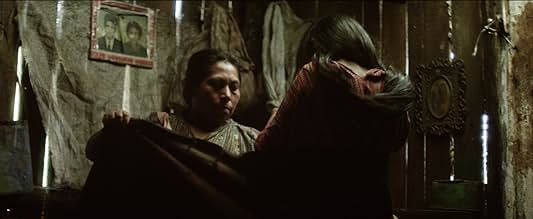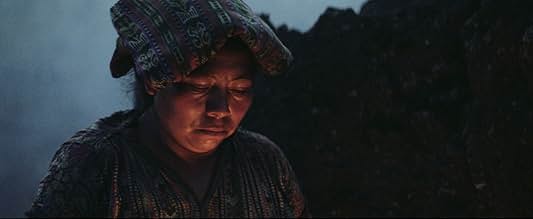AVALIAÇÃO DA IMDb
7,1/10
3,4 mil
SUA AVALIAÇÃO
Nas encostas de um vulcão ativo na Guatemala, seus pais Kaqchikel arranjam um casamento para Maria de dezessete anos.Nas encostas de um vulcão ativo na Guatemala, seus pais Kaqchikel arranjam um casamento para Maria de dezessete anos.Nas encostas de um vulcão ativo na Guatemala, seus pais Kaqchikel arranjam um casamento para Maria de dezessete anos.
- Direção
- Roteirista
- Artistas
- Prêmios
- 23 vitórias e 24 indicações no total
Avaliações em destaque
A beautiful film that very much transports the viewer to the struggles of a girl coming of age and working on a coffee plantation with her parents at the foot of a volcano in Guatemala. The cinematography is gorgeous, the story is heartfelt, and the performances all feel truly authentic. I thank Letterboxd user Muffintree for his suggestion to watch this film, and would recommend it to others as well.
It's clear early on that we're being plunged into a world without the luxury of pretense, where eating pork doesn't mean going in to the air-conditioned market and buying a neatly packaged cut of bloodless pink meat, and living with one's parents doesn't mean being able to pretend they don't have sex, since everyone sleeps in the same room. In this world coffee beans are tediously picked by hand, and workers (who speak indigenous Kaqchikel) are exploited by owners (who also speak the language of the ruling class, Spanish). The owners know that the laborers have few opportunities, and also run a bar where the workers might run up an alcohol tab that erases the earnings they receive from a careful weighing of the beans they've picked. All of this is so that affluent people in far-off lands like America can sip a gourmet brew, made to order by a person with a college degree in English Lit and getting a paltry minimum wage, but I digress.
The daughter (the soulful María Mercedes Coroy) has been betrothed to her father's boss, the foreman of the plantation, a situation that might improve her family's situation. Unfortunately she's more attracted to a field worker who dreams of running away to America to escape the poverty of his life in Guatemala, and drinks to excess maybe to escape it in another way. The way the parents (María Telón and Manuel Manuel Antún) support the daughter is amazing, despite the decisions she makes which have disastrous consequences. The mother-daughter bond is truly special and seems eternal, and I imagined it representing a link which must stretch back generations upon generations into the past. It was also pretty cool to see the father not erupt into anger, instead calmly accepting what happened as if a weather conditions had caused a bad crop one year. Nothing is romanticized here, but the film shows the family bond and perseverance in the face of a hard life, starting with accepting each other.
It's clear early on that we're being plunged into a world without the luxury of pretense, where eating pork doesn't mean going in to the air-conditioned market and buying a neatly packaged cut of bloodless pink meat, and living with one's parents doesn't mean being able to pretend they don't have sex, since everyone sleeps in the same room. In this world coffee beans are tediously picked by hand, and workers (who speak indigenous Kaqchikel) are exploited by owners (who also speak the language of the ruling class, Spanish). The owners know that the laborers have few opportunities, and also run a bar where the workers might run up an alcohol tab that erases the earnings they receive from a careful weighing of the beans they've picked. All of this is so that affluent people in far-off lands like America can sip a gourmet brew, made to order by a person with a college degree in English Lit and getting a paltry minimum wage, but I digress.
The daughter (the soulful María Mercedes Coroy) has been betrothed to her father's boss, the foreman of the plantation, a situation that might improve her family's situation. Unfortunately she's more attracted to a field worker who dreams of running away to America to escape the poverty of his life in Guatemala, and drinks to excess maybe to escape it in another way. The way the parents (María Telón and Manuel Manuel Antún) support the daughter is amazing, despite the decisions she makes which have disastrous consequences. The mother-daughter bond is truly special and seems eternal, and I imagined it representing a link which must stretch back generations upon generations into the past. It was also pretty cool to see the father not erupt into anger, instead calmly accepting what happened as if a weather conditions had caused a bad crop one year. Nothing is romanticized here, but the film shows the family bond and perseverance in the face of a hard life, starting with accepting each other.
I've long been interested in Mayan mythology and culture, so when I heard about a new movie from Guatemala in the Maya language, I knew it was a film I wanted to see. "Ixcanul" is the Maya word for volcano, which looms large in the film, both physically and as a psychological barrier between this village and the rest of the world.
Maria is a teenage girl, beautiful and bold. She lives with her parents, their only child, on a coffee plantation. Her parents have arranged her marriage to the plantation foreman, but neither seem particularly enthused about it. Instead, Maria dreams of escaping to the United States with a local worker. Despite her best attempts to get Pepe's agreement to take her with him North, she never secures a committed response. Her actions, however, have significant repercussions for her and her family.
This could be a film about the uncaring and unsympathetic corporate owners of the plantations, or it could be about the ignorance of peasant life in the Guatemalan villages, or it could be a film that romanticizes North American culture and lifestyle, but it is none of these things. What it is, is an intimate and honest story of a brief moment in time of a family caught on the crossroads of tradition and modernity. "Ixcanul" is Guatemala's first entry in the Academy Awards for Foreign Language Film, and it certainly deserves to win. I am intrigued by the language and have a few unanswered questions, so it is likely I will pick this one up for the collection when released.
Maria is a teenage girl, beautiful and bold. She lives with her parents, their only child, on a coffee plantation. Her parents have arranged her marriage to the plantation foreman, but neither seem particularly enthused about it. Instead, Maria dreams of escaping to the United States with a local worker. Despite her best attempts to get Pepe's agreement to take her with him North, she never secures a committed response. Her actions, however, have significant repercussions for her and her family.
This could be a film about the uncaring and unsympathetic corporate owners of the plantations, or it could be about the ignorance of peasant life in the Guatemalan villages, or it could be a film that romanticizes North American culture and lifestyle, but it is none of these things. What it is, is an intimate and honest story of a brief moment in time of a family caught on the crossroads of tradition and modernity. "Ixcanul" is Guatemala's first entry in the Academy Awards for Foreign Language Film, and it certainly deserves to win. I am intrigued by the language and have a few unanswered questions, so it is likely I will pick this one up for the collection when released.
Ixcanul is a practically flawless work of naturalistic cinema. Much has been said about the cutural specifics of the film, but not enough about Ixcanul as an argument for the vitality of naturalism, in an era that has been blinkered with frivolous spectacle. The movie treats its audience as adults, never telling them what to think or feel. It's beautifully lit and composed, subtle, thorny and complex. If you can find nothing engaging here, it's hardly the fault of the film.
Ixtanul is a very unique film in that it causes the viewers to question. This film essentially about a young girl named Maria, who prepares for her arranged wedding (set by her parents) as she overcomes unusual obstacles along the way. Although this film is slow and not very action-packed, it taught me a lot about Mayan culture and tradition in Guatemala. This film was unlike any film I have ever seen because of its mystery and lack of sound. There was almost no music in this film, which I thought was really interesting because it added uniqueness to the film. Also, the camera angles and shots were very different than most other films. Overall, this film taught me more about Guatemalan society than I have ever known.
Often times in Guatemala, you go watch a Guatemalan film solely for the sake of supporting your country. Ixcanul didn't feel that way, it is truly a film that transcends its origins and offers a story that feels universal. The story tackles topics such as agriculture, arranged marriages, pregnancy, among others. The film has a stunning cinematography and direction, which was quite impressive, some scenes do make use of the shaky camera method, which within context of what's happening in the film kind of make sense, however, they may feel a bit "out of place" considering the attention to detail that the rest of the film has.
Although all of the actors are debuting in this film, the acting is stellar, particularly from María Telón who commands the film and really delivers some of it's most powerful and emotionally effective scenes. In some instances, the actors don't need to speak for you to understand their feelings, almost like a silent picture. The Spanish-speaking actors are the only ones that I felt lacking, but their parts are minimal and are hardly detracting to the film.
Overall, Ixcanul is an eye-opener to people who are not familiar with the sad realities that the Kaqchikel people have to go through. It's the first film made in Guatemala that feels thought out, as well as culturally important and significant.
Although all of the actors are debuting in this film, the acting is stellar, particularly from María Telón who commands the film and really delivers some of it's most powerful and emotionally effective scenes. In some instances, the actors don't need to speak for you to understand their feelings, almost like a silent picture. The Spanish-speaking actors are the only ones that I felt lacking, but their parts are minimal and are hardly detracting to the film.
Overall, Ixcanul is an eye-opener to people who are not familiar with the sad realities that the Kaqchikel people have to go through. It's the first film made in Guatemala that feels thought out, as well as culturally important and significant.
Você sabia?
- CuriosidadesThe film was selected as the Guatemalan entry for the Best Foreign Language Film at the 88th Academy Awards but was not nominated.
- Trilhas sonorasMala Mujer
[from the albumLos Mejores Éxitos Bailables Vol. 2. Música de Guatemala"]
Performed by Fidel Funes Y Su Marimba Orquesta
Written by Fidel Funes
Published by Edifosa
Courtesy of Difosa
Principais escolhas
Faça login para avaliar e ver a lista de recomendações personalizadas
- How long is Ixcanul?Fornecido pela Alexa
Detalhes
- Data de lançamento
- Países de origem
- Centrais de atendimento oficiais
- Idiomas
- Também conhecido como
- Ixcanul
- Locações de filme
- Empresas de produção
- Consulte mais créditos da empresa na IMDbPro
Bilheteria
- Faturamento bruto nos EUA e Canadá
- US$ 295.157
- Faturamento bruto mundial
- US$ 594.836
- Tempo de duração1 hora 33 minutos
- Cor
- Proporção
- 2.35 : 1
Contribua para esta página
Sugerir uma alteração ou adicionar conteúdo ausente

Principal brecha
By what name was O Vulcão Ixcanul (2015) officially released in India in English?
Responda




















